 Petzlover
Petzlover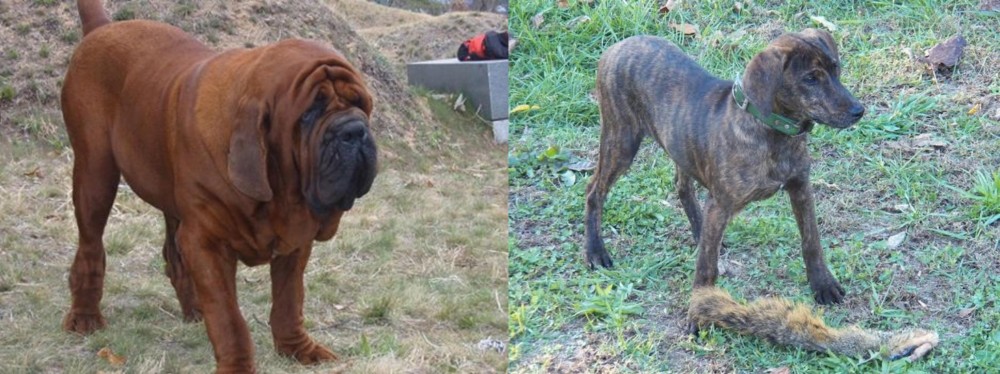 Korean Mastiff is originated from South Korea but Treeing Cur is originated from United States. Korean Mastiff may grow 15 cm / 6 inches higher than Treeing Cur. Korean Mastiff may weigh 47 kg / 104 pounds more than Treeing Cur. Both Korean Mastiff and Treeing Cur has same life span. Both Korean Mastiff and Treeing Cur has almost same litter size. Korean Mastiff requires Moderate Maintenance. But Treeing Cur requires Low Maintenance
Korean Mastiff is originated from South Korea but Treeing Cur is originated from United States. Korean Mastiff may grow 15 cm / 6 inches higher than Treeing Cur. Korean Mastiff may weigh 47 kg / 104 pounds more than Treeing Cur. Both Korean Mastiff and Treeing Cur has same life span. Both Korean Mastiff and Treeing Cur has almost same litter size. Korean Mastiff requires Moderate Maintenance. But Treeing Cur requires Low Maintenance
 This large breed dog is also known as the Mee Kyun Dosa. In spite of his huge size, he isn’t aggressive at all and is bred to be a companion dog.
This large breed dog is also known as the Mee Kyun Dosa. In spite of his huge size, he isn’t aggressive at all and is bred to be a companion dog.
He was originally developed to be a working dog. The dog was developed in the late 1800’s from European and Asian working breeds. Those interested in dog breeds suspected that a crossing of the Japanese Tosa-Inu with the Neapolitan Mastiff and the Dogue de Bordeaux brought about the breed. They also thought that the Saint Bernard and English Mastiff were brought in later on as well.
These large molosser dogs have been developed through years of inbreeding. It is one of the biggest dogs in Korea.
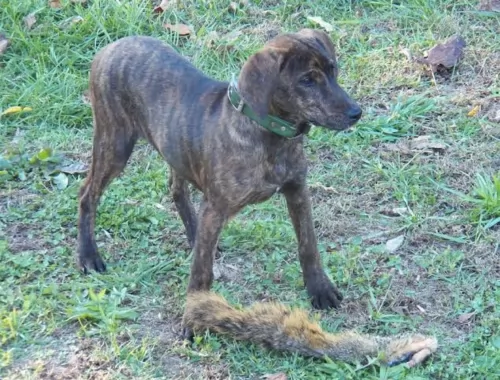 The Treeing Cur dog is a mixed-breed, working dog which hails from the USA and recognized by the United Kennel Club in November 1998.
The Treeing Cur dog is a mixed-breed, working dog which hails from the USA and recognized by the United Kennel Club in November 1998.
They’ve always been used to tree animals such as squirrels, raccoons, bears, and even mountain lions. They were developed to be used as hunting and guarding dogs.
Aside from these good qualities, today the dog makes an excellent family companion.
 You can’t help but stare at the Korean Mastiff because of his strong, muscular neck of loose skin that forms dewlaps. His face is wrinkled and he has a cumbersome, sluggish gait.
You can’t help but stare at the Korean Mastiff because of his strong, muscular neck of loose skin that forms dewlaps. His face is wrinkled and he has a cumbersome, sluggish gait.
He is a large dog standing at anything between 59 to 76cm in height, both male and female. He can weigh between 65 to 74kg. He is noticeable because of his fairly loose fitting coat, which is short and smooth and which is a rich, shiny reddish, orange or brown colour.
The nose of the dog is broad and dark, the ears soft and floppy and he has eyes which are set wide apart.
The Korean Mastiff is reserved with strangers but he is friendly and even tempered with his human family, making an ideal pet.
He is looked upon as a gentle giant, being an oversized playmate for children and he also tolerates other pets in the home.
He isn't an overly energetic dog, but that doesn't mean he shouldn't be exercised. He will need long walks to avoid him putting on weight.
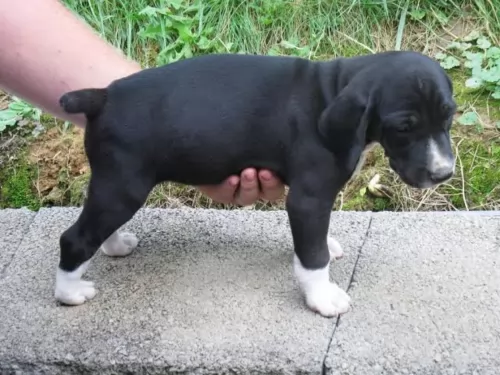 Standing at between 46 – 61cm in height and weighing between 14 – 27kg, the medium-sized Treeing Cur is athletic and muscular.
Standing at between 46 – 61cm in height and weighing between 14 – 27kg, the medium-sized Treeing Cur is athletic and muscular.
He has a short to medium-length double coat that can be in a number of colors. Red and white, tan and white, black and white, brindle, some freckling and bi-colored or tri-colored.
The eyes are mostly brown but can be green or blue too. They’re well-muscled and robust and have medium length floppy ears. The tail is mostly docked but is sometimes left long.
These dogs are alert and intelligent, being easy to train and wanting to please their owners, getting along well with all members of the family, including children and other dogs.
They’re strong-willed dogs and will require training and socialization if you want them to be well behaved wherever they are. He is intelligent so there won’t be any trouble with training him. He is very responsive to what his owner requires of him, with a desire to make their owners pleased with them.
 Your huge Korean Mastiff is a good natured dog who isn’t aggressive. He loves being with his human family and makes a particularly good pet when he has been trained and socialized.
Your huge Korean Mastiff is a good natured dog who isn’t aggressive. He loves being with his human family and makes a particularly good pet when he has been trained and socialized.
He likes a firm but fair owner who takes a leader-of-the-pack role. In spite of his largeness and sluggishness, he can be quite agile and makes a good watchdog too.
All round, the Korean Mastiff, known as a gentle giant, is capable of making you a splendidly friendly, loving canine companion.
 The Treeing Cur is a working dog that loves all the action. He is an alert, intelligent dog, and being territorial and protective, he makes an excellent guardian dog too.
The Treeing Cur is a working dog that loves all the action. He is an alert, intelligent dog, and being territorial and protective, he makes an excellent guardian dog too.
They can show some aggression towards strangers and other dogs they don’t know. Apart from being an excellent hunting dog, the Treeing Cur loves to be around their human family, making loyal and loving companions.
 Treat your big Mastiff dog like the wonderful fur-child he is and make sure your attend to all his medical needs to avoid pain and discomfort for him.
Treat your big Mastiff dog like the wonderful fur-child he is and make sure your attend to all his medical needs to avoid pain and discomfort for him.
Cherry eye is a fairly common health issue with this breed. It affects the tear gland of the third eyelid, and if left untreated, can lead to ongoing eye problems.
All dogs have a third eyelid, as well as two tear producing glands to lubricate the eyes. Its an important protective component to eye health in dogs. When the connective tissue that holds the gland in place is damaged or weak, there is a red protrusion of the gland from the lower eye. This is a congenital disorder. Don’t ignore it, but get your pet to the vet so you can catch it early.
Canine bloat, known as gastric dilatation and volvulus can be a killer disease for your pet, more so with deep-chested, large breeds.
Gas accumulation is known as bloat, and its the accumulation of gas which can cause the stomach to rotate. A dog can go into shock from bloat. The reason for this is that the stomach expands, putting pressure on veins. Blood can’t flow as it should and the blood supply gets cut off to the stomach.
Your dog could be vomiting, restless, the stomach hard and bloated or he may be drooling. Dogs who gobble their food down and eat just one large meal a day have an increased susceptibility to GDV than other dogs.
The wrong ingredients of a dog’s diet can also contribute to bloat. High quality food and feeding your pet smaller meals can help.
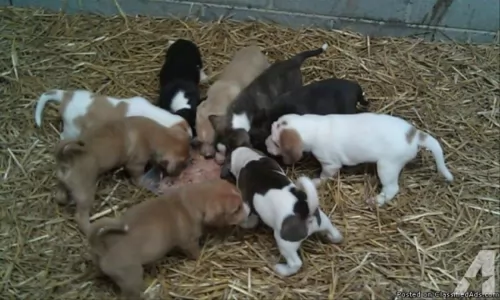 These dogs are very healthy and you’re not likely to have many vet bills when you bring one into your home.
These dogs are very healthy and you’re not likely to have many vet bills when you bring one into your home.
The Treeing Cur has floppy ears, and particularly if it's a dog that loves swimming, it will battle with moisture in the ears. Dogs with floppy ears don’t have good air-flow inside the ears like a dog with erect ears would have. This means that the dog is prone to ear infections.
This is such a common dog illness that can strike even young dogs. That is why it is important to check your dog over regularly for lumps and bumps on the body. Age increases the risk of cancer, so if you feel an unusual lump on your Treeing Cur, better to have your dog checked out at the vet.
 A Korean Mastiff is an easy dog to groom with his short smooth coat. He is a moderate shedder so a brush twice a week will be sufficient to maintain the shiny, smooth condition of his coat.
A Korean Mastiff is an easy dog to groom with his short smooth coat. He is a moderate shedder so a brush twice a week will be sufficient to maintain the shiny, smooth condition of his coat.
Because the dog has lots of skin and folds, these folds will need to be washed and kept clean as grime can collect.
While you're busy attending to his skin check his nails too and check inside and outside his ears for signs of redness and irritation.
Puppies use up more energy than mature adults, requiring a diet of good quality protein. Dogs that have been spayed or neutered will require less calories as will senior dogs.
Korean Mastiffs require high quality nutrition, and if its dry kibble, make sure its the best brand. Mix in some home-made food such as cooked chicken, brown rice and vegetables from time to time as well as some raw meat occasionally.
Protein and fat from good sources are top ingredients for your Korean Mastiff. Avoid food with allergens such as corn and wheat, sweeteners, preservatives and colorants.
Make sure your large pet has constant access to fresh water.
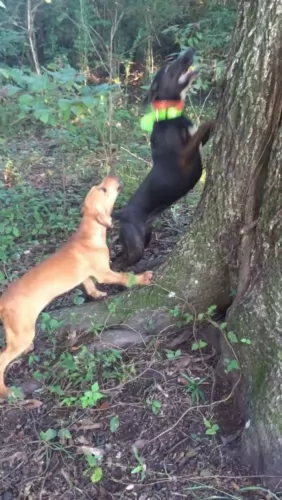 Being an energetic working dog, this dog isn’t going to be content to be lying around. He is going to need regular exercise. He loves a brisk walk or even a run next to you when you go cycling.
Being an energetic working dog, this dog isn’t going to be content to be lying around. He is going to need regular exercise. He loves a brisk walk or even a run next to you when you go cycling.
When at home, you can consider ball games and hide and seek games with him. They just love to run, and if you live near a park, he will want to be off the leash if possible for some free running and sniffing around.
The short coat of the Treeing Cur will do well with a brush twice a week. While you brush your dog, check him out for ticks and fleas. Also, check him over for any unusual lumps.
Part of his grooming should be to check inside his ears for signs of redness, to make sure his eyes are nice and bright still and to see if he will let you look inside his mouth for bad teeth. Bad teeth can be a source of pain for him.
Caring for your Treeing Cur in a responsible manner means ensuring good food. Such an active dog will require proper nutrients so as to meet his energy and health needs.
Your Treeing Cur will need a high-quality commercially manufactured dog food for active dogs and they will also benefit from other simple cooked foods such as boiled chicken, brown rice and vegetables. The habit of feeding your Treeing Cur human foods such as chocolates, popcorn, peanuts, onions and spices could cause digestive upsets and possible vet fees.